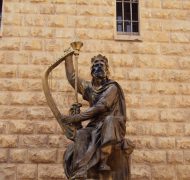David’s Patronage of the Musical Arts (1 Chronicles 25)
Bible Commentary / Produced by TOW Project
1 Chronicles adds a detail not found in 2 Samuel and 1 Kings. David creates a corps of musicians “to make music at the house of the Lord.”
They were all under the direction of their father for the music in the house of the Lord with cymbals, harps, and lyres for the service of the house of God. Asaph, Jeduthun, and Heman were under the order of the king. They and their kindred, who were trained in singing to the Lord, all of whom were skillful, numbered two hundred eighty-eight. (1 Chronicles 25:6–7)
Maintaining an ensemble the size of two modern symphony orchestras would be a major undertaking in an emerging nation in the 10th century BC. David does not regard it as a luxury however, but as a necessity. In fact, he orders it in his role as commander in chief of the army, with the consent of the other commanders (1 Chron. 25:1).
Many militaries today maintain bands and choruses, but few other kinds of workplaces do, unless they themselves are musical organizations. Yet there is something about music and the other arts that is essential to work of all kinds. God’s creation—the source of human economic activity—is not only productive, it is beautiful (e.g., Genesis 3:6; Psalm 96:6; Ezekiel 31:7-9), and God loves beautiful handiwork (e.g., Isaiah 60:13). What is the place of beauty in your work? Would you or your organization or the people who make use of your work benefit if your work created more beauty? What does it even mean for work in your occupation to be beautiful?





